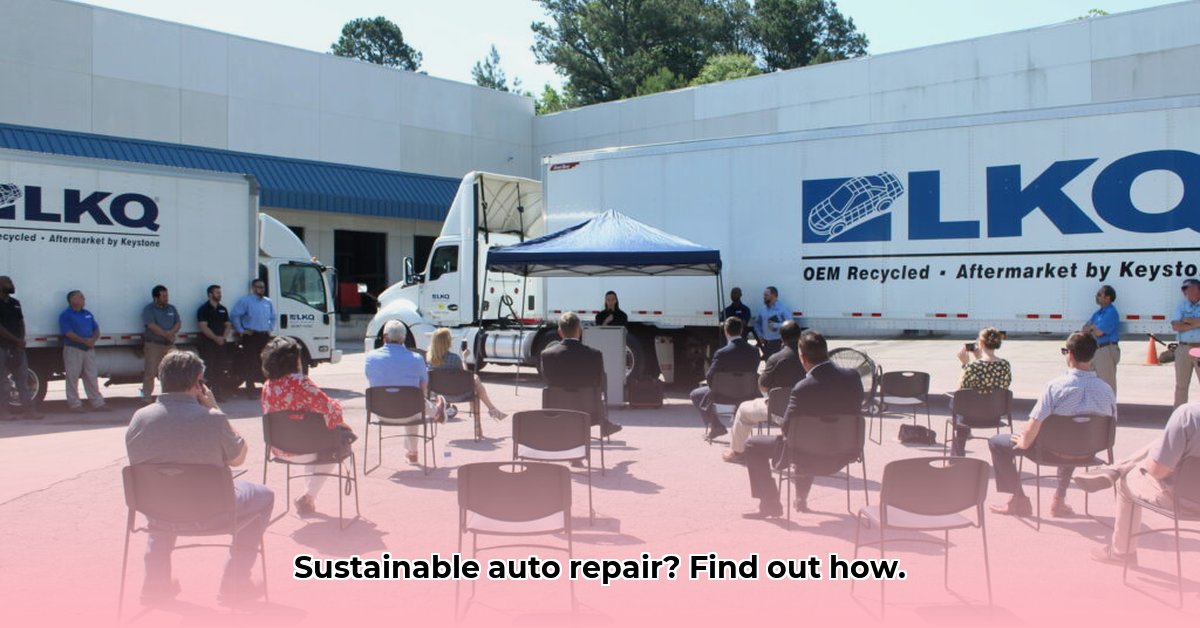
LKQ Asheville NC: Your One-Stop Shop for Smart Car Repair
Finding affordable and reliable car parts in Asheville, North Carolina can be challenging. But LKQ offers a unique solution, serving both DIY enthusiasts and professional mechanics. This article explores LKQ's Asheville operations, weighing the pros and cons, and highlighting its impact on the local community and the environment. For more local Asheville auto repair options, check out this helpful resource.
Understanding the LKQ Asheville Network: Pick Your Part and Keystone Automotive
LKQ's Asheville presence comprises two interconnected businesses: LKQ Pick Your Part (LPYP) and Keystone Automotive Industries (KAI). LPYP is a self-service junkyard where customers can find and remove parts themselves, offering significant cost savings. KAI, conversely, supplies new and remanufactured parts to professional mechanics, prioritizing reliability and speed. Both models contribute to LKQ's overall mission of sustainable auto repair.
LKQ Asheville: Weighing the Pros and Cons for Consumers
For the average car owner, LKQ presents a mixed bag of advantages and disadvantages.
LKQ Pick Your Part (LPYP):
Pros:
- Significant Cost Savings: LPYP offers drastically reduced prices compared to new parts, making car repairs more affordable.
- Eco-Friendly Approach: Recycling used parts reduces waste and promotes environmental sustainability.
- DIY Empowerment: The hands-on experience empowers mechanically inclined individuals.
Cons:
- Time Investment: Finding the right part requires time and effort.
- Limited Warranties: Used parts typically carry little to no warranty.
- Mechanical Expertise Required: Assessing part condition necessitates basic mechanical knowledge.
- Risk of Further Damage: Improper removal can cause additional damage.
Keystone Automotive Industries (KAI):
Pros:
- High Reliability: KAI provides high-quality parts often backed by warranties, ensuring peace of mind.
- Streamlined Convenience: Mechanics benefit from a dependable supply chain and efficient ordering processes.
- Professional Support: KAI offers customer service and expert assistance.
Cons:
- Higher Costs: Parts from KAI are significantly more expensive than those from LPYP.
- Limited Consumer Access: KAI primarily caters to professional mechanics.
The Mechanic's Perspective: LKQ Asheville and Supply Chain Reliability
For auto repair shops, a reliable parts supplier is crucial. KAI provides this reliability, ensuring consistent access to parts, thus minimizing downtime and maximizing revenue. The option to source both new and remanufactured parts adds crucial flexibility. The availability of cost-effective parts from LPYP for certain repairs also serves as a beneficial operational cost control factor for mechanics.
LKQ Asheville and the Environment: A Balancing Act
LKQ's model significantly reduces the environmental footprint of the automotive industry. By recycling and reusing parts, it diverts waste from landfills and conserves resources. However, potential issues regarding proper disposal and part inspection need careful management. Continued investment in environmentally sound dismantling practices is essential to minimize these risks.
The Future of LKQ Asheville: Innovations on the Horizon
LKQ Asheville is poised for growth. Industry trends point towards increasing online integration, offering consumers improved access to inventory and potentially home delivery. Further technological advancements in part refurbishment and inventory management systems are likely, enhancing efficiency and the customer experience. The existing integration between LPYP and KAI will likely see further improvements, creating a more responsive and efficient system.
Actionable Insights for Smart Car Repair
The best choice between LPYP and KAI depends on individual needs.
For Consumers (DIYers):
- Evaluate Your Mechanical Skills: Can you confidently remove and assess parts?
- Budget Wisely: Determine your repair budget to make optimal choices.
- Consider Warranty Implications: Account for the lack of warranties on used parts.
For Mechanics:
- Prioritize Reliability: KAI guarantees the quality and often provides warranties.
- Assess Cost-Effectiveness: Evaluate situations where LPYP could offer cost savings without compromising quality.
- Manage Risk and Reward: Weigh the considerable price advantages of LPYP against potential warranty complications.
How to Measure LKQ Corp's Automotive Parts Recycling Program Effectiveness
LKQ's commitment to sustainable auto parts recycling is transforming the industry. Measuring its effectiveness requires a holistic approach going beyond simple part count.
Measuring Success: A Multi-Faceted Approach
Effective measurement incorporates several key metrics:
- Parts Recovery Rate: The percentage of a salvaged vehicle successfully reused.
- Processing Time: The speed of assessment, disassembly, and preparation for resale.
- Parts Quality: Recycled parts should meet or exceed quality standards.
- Environmental Impact: Quantifying waste diverted from landfills and greenhouse gas emission reduction.
- Customer Satisfaction: Feedback from both mechanics and consumers is vital.
The Role of Technology: Challenges and Opportunities
AI, as employed by LKQ in partnership with Tractable [1], greatly accelerates the recycling process. However, maintaining AI accuracy and addressing data security concerns remain crucial ongoing challenges.
Beyond the Numbers: A Broader Perspective
Assessing LKQ's impact also requires considering:
- Job Creation: Jobs created or sustained by LKQ's recycling initiatives.
- Community Impact: Economic contributions to local communities like Asheville.
- Industry Partnerships: Collaborations fostering broader sustainability across the industry.
In conclusion, LKQ Asheville's dual approach to car repair offers affordability and reliability. Understanding the nuances of LPYP and KAI empowers informed decision-making, promoting both cost savings and sustainable auto repair practices. The future looks bright with continuous improvements in efficiency and overall consumer experience.